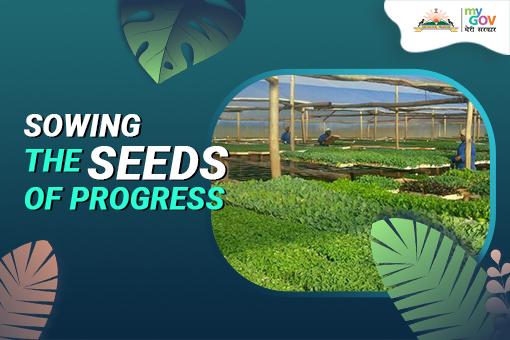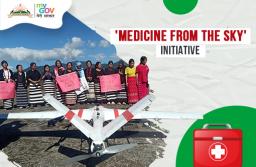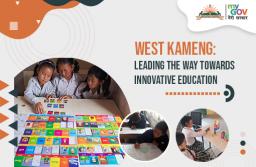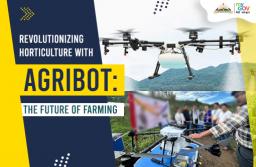The inauguration of the Mega Polyhouse Nursery at KVK Tawang by Minister Gabriel D. Wangsu marks a transformative step in Arunachal Pradesh’s agricultural journey.
Strategically designed for Tawang’s high-altitude conditions, this cutting-edge facility stands as a hub for innovation, training, and farmer empowerment. By offering high-quality seedlings and introducing modern horticultural practices, the nursery aims to:
Boost local productivity
Reduce dependence on imported produce
Promote sustainable and climate-resilient farming
Join the MyGov Dialogue:
How can this successful model be replicated in other districts of Arunachal Pradesh?
What kind of support, training, infrastructure, or market linkage is most crucial to maximize its impact?
Let’s grow together for a greener, self-reliant future.













BrahmDevYadav 1 week 2 days ago
Which farming is the best for future?
Sustainability is a major focus of the farming evolution, with methods like regenerative agriculture gaining traction. Unlike traditional farming, which can deplete soil and water resources, regenerative agriculture aims to restore soil health, increase biodiversity and reduce greenhouse gas emissions.
BrahmDevYadav 1 week 2 days ago
What is the difference between sustainable agriculture and modern agriculture?
While modern agriculture has been vital in increasing food production, its negative environmental impact poses a severe risk to the long-term sustainability of our food systems. Meanwhile, sustainable agriculture focuses on ecological balance and resource conservation as well as promoting environmental sustainability.
BrahmDevYadav 1 week 2 days ago
What are the three pillars of sustainability?
The three pillars of sustainability are environmental, social and economic. These pillars are interconnected and essential for creating a sustainable future.
BrahmDevYadav 1 week 2 days ago
What is natural farming for sustainable agriculture?
Natural farming is a sustainable agricultural approach that prioritizes natural processes and locally adapted ecosystems, aiming for a self-sustaining system in harmony with nature. It minimizes chemical inputs like fertilizers and pesticides, opting instead for practices like biomass mulching, cow dung-urine formulations and on-farm resource optimization. This method fosters soil health, biodiversity and resilience to climate change.
BrahmDevYadav 1 week 2 days ago
Which SDG is sustainable agriculture?
The Sustainable Development Goal to “End hunger, achieve food security and improved nutrition and promote sustainable agriculture” (SDG2) recognizes the inter linkages among supporting sustainable agriculture, empowering small farmers, promoting gender equality, ending rural poverty, ensuring healthy lifestyles.
BrahmDevYadav 1 week 2 days ago
How does organic farming promote sustainable development?
Organic farming is one of the several approaches to meet the objectives of sustainable development of agriculture. It avoids the use of synthetic chemicals as well as genetically altered organisms and usually subscribes to the principle of sustainable farming.
BrahmDevYadav 1 week 2 days ago
What is the biggest problem for organic farmers?
1. Land and Resource Requirements:- Organic farming requires more land to produce the same
yield as conventional farming.
2. Seasonal Constraints:- Organic produce is subject to seasonal variations and local climate
conditions.
3. Yield Challenges.
BrahmDevYadav 1 week 2 days ago
What is the biggest problem for organic farmers?
1. Land and Resource Requirements:- Organic farming requires more land to produce the same
yield as conventional farming.
2. Seasonal Constraints:- Organic produce is subject to seasonal variations and local climate
conditions.
3. Yield Challenges.
BrahmDevYadav 1 week 2 days ago
What farming methods are not sustainable?
1. Overusing Chemical Fertilizers and Pesticides.
2. Reliance on Hormones and Antibiotics.
3. Monoculture Farming.
4. Excessive Tillage.
5. Overusing Land.
BrahmDevYadav 1 week 2 days ago
Which farming is better for environment?
Organic farming: Organic farming prohibits the use of synthetic pesticides, fertilizers, genetically modified organisms and growth regulators.